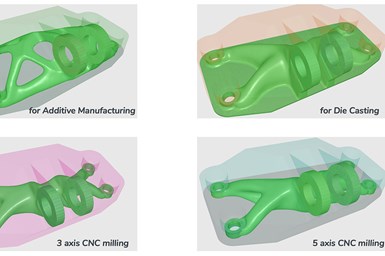ParaMatters’ CogniCAD 4.0 Delivers Smooth, Automated Workflow
Design platform enables both digital and traditional manufacturers to automate design-to-manufacturing processes.

CogniCAD 4.0 delivers smooth, automated workflow.
ParaMatters’ CogniCAD 4.0 software upgrade delivers a smooth, automated workflow from design to manufacturing for both digital and traditional manufacturers. The software automatically generates ready-to-manufacture, high-performance, lightweighted structures for aerospace, automotive and other mission-critical applications.
The company says that CogniCAD 4.0 gives engineers and designers the flexibility to generate effective designs using a wide range of manufacturing options, including the use of additive manufacturing (AM), 3-axis and 5-axis CNC milling, and investment and die casting. Version 4.0 provides more robust and faster solvers which enhance vibration and stress constraints design with more control over geometry and manufacturing, like multiplane symmetry constraints and accurate feature size. It offers a new advanced support structures generator to help designers and engineers prepare files for 3D printing, and optimal part orientation, fast slicing and hollowing for investment casting with new features for latticing and gyroids to enable greater efficiency while saving on materials for prototyping.
CogniCAD 4.0 works by first importing CAD files into the platform and then defining loading, design and manufacturing criteria. Within tens of minutes, users can obtain generative designs verified by built-in, finite-element analysis, ready for 3D printing in both STL/PLY and STEP formats. All ParaMatters-generated designs can be directly produced using AM and can also be transferred to traditional manufacturing processes.
Related Content
-
3MF File Format for Additive Manufacturing: More Than Geometry
The file format offers a less data-intensive way of recording part geometry, as well as details about build preparation, material, process and more.
-
3D Printed "Evolved Structures" for NASA Exoplanet Balloon Mission: The Cool Parts Show #61
Generative design creates stiff, lightweight brackets for EXCITE mission monitoring planets orbiting other stars. The Cool Parts Show visits Goddard Space Flight Center.
-
Implicit Modeling for Additive Manufacturing
Some software tools now use this modeling strategy as opposed to explicit methods of representing geometry. Here’s how it works, and why it matters for additive manufacturing.










